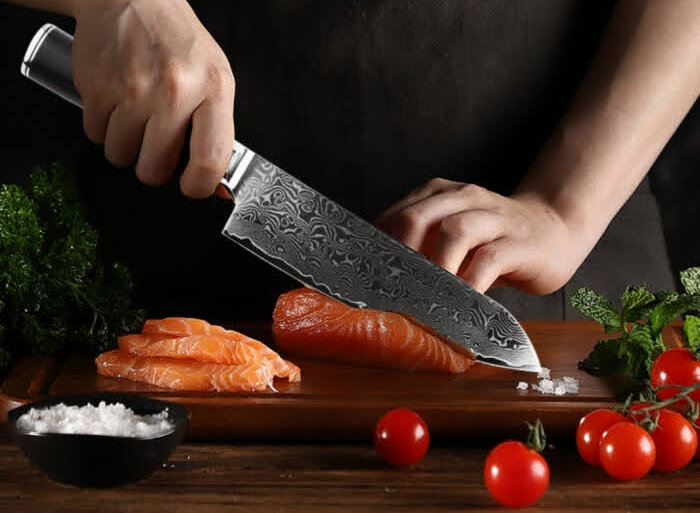For anyone involved in the culinary arts, whether professional or aspiring, selecting the right knife is crucial. Among the myriad of options available, two of the standout choices are the Santoku knife and the traditional Chef knife, particularly when forged from the beautiful Damascus steel. In this article, well explore the santoku vs chef knife damascus comparison to highlight their distinct characteristics and help you make a well-informed decision for your kitchen needs.
The allure of high-quality knives is universal, and modern chefs not only seek functionality but also a touch of artistry in their tools. Lets unpack these two iconic knives before diving into how Damascus steel enhances their appeal.

Basics of Santoku and Chef Knives
Santoku Knife
Originating from Japan, the Santoku knife is expertly crafted for slicing, dicing, and mincing. With a slightly shorter blade, typically between 5-7 inches, and a unique 'sheep's foot' tip, this knife offers remarkable precision for every cut. Its name translates to 'three virtues,' signifying its versatility in managing a variety of cooking tasks.
Chef Knife
In contrast, the Chef knife is a staple in Western kitchens. Sporting a wider and longer blade, usually around 8-10 inches, its designed for a rocking cutting motion, making it perfect for chopping larger vegetables and proteins. Its pointed tip is essential for tasks that require finesse in the kitchen.
The Unique Allure of Damascus Steel
The eye-catching patterns of Damascus steel are not merely for aesthetics; theyre the result of a unique forging technique that imparts exceptional strength and durability to the material. While the origins of Damascus steel are shrouded in history, its modern-day charm is highly regarded among culinary professionals and knife enthusiasts. For deeper insights, check out HowStuffWorks.
Benefits of Damascus Steel in Kitchen Knives
When we delve into the santoku vs chef knife damascus comparison, it's evident that utilizing Damascus steel transforms these knives into top-tier tools that blend beauty with practicality. They feature razor-sharp edges that resist chipping, all while offering flexibility a real boon for cutting through various ingredients.
Additionally, the distinctive pattern-welded steel enhances not just the elegance of the blade but also signifies the chefs commitment to quality, often sparking engaging conversations among peers.
Deciding Between Santoku and Chef Knife with Damascus Steel
Both Santoku and Chef knives have compelling advantages making them worthy additions to your kitchen, yet there are key differences that can dictate their suitability for specific tasks.
The Santoku knife excels in intricate kitchen tasks requiring finely controlled cuts, especially when working with delicate ingredients like fish and herbs, where precision is paramount.
On the other hand, the Chef knife shines when handling larger cuts, providing extensive surface area and accommodating a broader array of culinary techniques that many chefs find indispensable.
Comfort and Versatility
A pivotal aspect to consider is how each knife feels in your hand. Both knives are ergonomically designed, but individual preferences are significant. Trying out a knife can often be the deciding factor, allowing you to choose which aligns best with your cooking style and kitchen tasks.
Conclusion: The Perfect Choice for You
Ultimately, choosing between the Santoku knife and the Chef knife, both enhanced by Damascus steel, boils down to personal preference and your specific culinary needs. Each knife has established itself as an essential tool in professional kitchens, marrying exceptional performance with outstanding craftsmanship.
To further your culinary expertise, delve into our kitchen craftsmanship section for additional resources. Whether honing your skills or your tools, the right knife can truly elevate your cooking game.

FAQ
What makes Damascus steel unique?
The uniqueness of Damascus steel lies in its special forging process, producing durable blades that resist shattering and maintain a keen edge over time. Its distinctive patterns add both beauty and functional robustness.
Should I go for a Santoku or Chef knife for general kitchen use?
Your choice depends on the primary tasks you perform in the kitchen. Opt for the Santoku knife for precision, or the Chef knife for versatility and larger cuts.
How do I maintain my Damascus steel knife?
Regular upkeep is essential. Hand wash gently, dry promptly, and sharpen using a whetstone. Storing your knife properly in a knife block or on a magnetic strip will also help sustain its edge.
This article contains affiliate links. We may earn a commission at no extra cost to you.


























